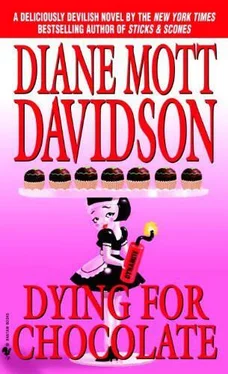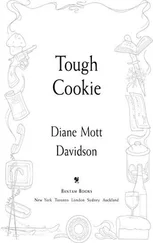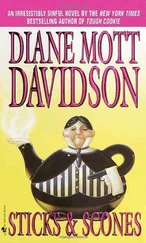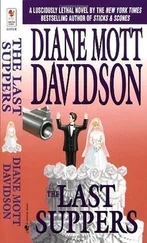At that moment, the headmaster appeared from behind the switchboard operator. I had never seen him up close. He was a baby-faced fellow whose round-rimmed glasses gave him the look of a young owl. Despite the fact that we were halfway through June, he was wearing tweeds. Mister Rogers goes to Yale. He peered at us and frowned. Trouble in the neighborhood.
“Here are your decals,” said Joan Rasmussen as she handed me a packet. “Thank you for volunteering your time so generously.”
A noise arose from deep in my throat. “Ommmmmmmm.”
There was a simultaneous sharp intake of breath from Joan and the headmaster as the two of them fixed their eyes at a point beyond my shoulder. Glancing backward, I saw a senior member of the Coors family coming through the doors of the school lobby. Too late I realized that the only thing between the headmaster and all those brewery millions was me.
“Gah!” I yelled as the headmaster mowed me down. I teetered backward and then fell over the imitation-leather bench. The fund-raising packet flew up out of my hand. My back hit the wall and I landed ungracefully on the floor. Decals floated down like confetti.
Joan Rasmussen marched off to use one of the phones. The switchboard operator continued to sing her greeting to callers. As I gathered up the decals from the floor, I watched the headmaster do a slithery Uriah Heep routine with the politely attentive Mr. Coors.
“What happened here?” said Sissy Stone from far above me.
I looked up and tried to give her a big smile. When we had last parted, she had not been in a terrific mood.
“I’m cleaning up my decals, what else?”
She craned her neck around to see if anyone more important was in the vicinity. “My, my, look who’s here,” she said under her breath.
“I don’t suppose you’d be interested in gathering some of these up?”
She sighed with great drama. “Sorry. I’m waiting for Julian, and I can’t get my pants dirty on the floor.”
I grunted, and stuffed the last of the decals into the envelope. When I had heaved myself back up on the bench I thought again about what Elizabeth had told me about Philip’s problematic clients. I gave Sissy a long look. Perfect makeup, perfect hair, perfect rounded and polished nails, perfect pink-on-blue printed blouse coordinated with blue-on-pink printed pants. Miss Perfect had worked for Philip Miller. I wondered if he had been interested in her psychological makeup as well.
I said, “Let’s go have a Coke. I’ve lost Arch. I’m parched, and I want to talk to you about something. Does this school have a lounge?”
Her pretty face clouded. “We used to have vending machines in the basement. But the parents protested against chips and cookies and soft drinks. Now you can get juice and granola bars and stuff they sell at Elizabeth Miller’s store. They still call it the snack corner. Should be the birdseed corner, if you ask me.”
I forced a smile. “Let’s go anyway. Get healthy.”
I gave a sidelong glance back at the headmaster and his wealthy prisoner before Sissy and I headed down to the snack corner. Maybe having money wasn’t such a good thing after all. We successfully avoided another encounter with Joan Rasmussen and within a few minutes were happily munching on peanut butter-coconut bars and drinking strawberry-guava juice. It’s hard to think of how to frame questions with several tablespoons of peanut butter cemented to the roof of your mouth, but I tried.
“I miss Philip Miller,” I said finally, after taking a long pull on the grotesquely sweet juice.
“Yeah, he was a good guy.”
“I understand you shadowed him during the school year.” I tried to sound wistful.
She pulled down the corners of her mouth. “Nothing sensitive, you know. Nothing confidential.”
“Right,” I said, shaking my head, “absolutely not. I know how he was about ethics and all that.” To avoid grinding my teeth, I took a tiny bite of granola bar. “So what were you doing for him, then?”
“Oh, he used to talk to me about his schedule, the kind of problems he saw, what kind of training you had to have. Sometimes he would give me research projects. I hadn’t heard from him in a while. Then the last week he was”—she hesitated and cleared her throat—“you know, alive, he asked me to work on something. He was kind of in a panic about it, it seemed to me. He knew about the case, but needed specifics. He didn’t have time to get all the details from the research.” She finished her juice and set it down on the linoleum floor, then gazed at the wall. “Tarasoff versus California,” she said in a far-off voice.
“Excuse me?”
She puckered her lips in thought. “It was a court case. I was running it through InfoTrac at the library, trying to find articles to help him see how it applied to him.”
“I don’t get it.”
“Tarasoff was the last name of a woman in California. She was dating this guy, and he was in therapy. There at the psychiatric clinic at one of the University of California schools. I forget which. Anyway. The Tarasoff woman dumped the guy. The guy went in to see his therapist. He was a mess. Said he wanted to kill this woman who just dumped him. The shrink recognized that the guy was unbalanced. You know?”
For once, Í did.
She went on, “So the shrink tried to get the guy institutionalized. He realized the guy was losing it. But the guy terminated his therapy instead. The shrink called the campus police. He was worried about protecting the confidentiality of his client, but he was also worried for the woman named Tarasoff. Without telling the cops why, he asked them to beef up their security around the house where the Tarasoff woman lived.” She paused.
“And did they?”
“Yeah, they did. But it wasn’t enough.” Sissy’s voice caught. “The guy killed her.”
“Sheesh.” I thought for a minute. “But who brought suit?”
Sissy pushed her pink-and-blue striped Pappagallos out in front of her and crossed her legs. “Her relatives did. They sued the University Regents, since the guy, the killer, had been going to a shrink connected with the school. The court maintained that the shrink had a greater obligation to keep the Tarasoff woman alive than to protect the confidentiality of his client.”
“What do you mean?”
Sissy gave me a long look. “The idea was that the mental-health counselor had a duty to warn the person whose life was in danger.”
“Who won?”
“The Tarasoffs. That’s what I told Philip the day before he died. If he knew that somebody wanted to kill somebody, he had to warn the would-be victim. That was his legal duty.”
“Holy cow. Do you know if he did?”
She shook her head. “I think he was going to do something, tell whoever it was that there was danger. Have the person call the cops or something, but I can’t be sure.”
I stared at her, transfixed. The call Schulz had received just before the accident. From the Aspen Meadow Country Club.
You gotta come help me, my life’s in danger.
20.
At that moment, Julian came shuffling down the stairs to the so-called snack bar. How long had he been listening? I did not know.
“Hey, what’s happening,” he said. I said nothing. He scanned Sissy’s face and then mine. He was looking for a mood.
“Are you done with your lab work yet?” Sissy demanded.
“Yeah, I’m done, are you upset?”
She assumed a light tone. “I’d hate to think what would happen if you actually had to be responsible, Julian. Now you have to drive back to the club, and I’m going to be late for the library. If you were me, would you be upset?”
I took a deep breath and said, “Now, now.” Almost immediately, I regretted opening my mouth. Both teenagers turned mind-your-own-beeswax looks in my direction. I said, “I’ll take Arch home if it will speed things up. There’s really no need for a conflict here.”
Читать дальше












